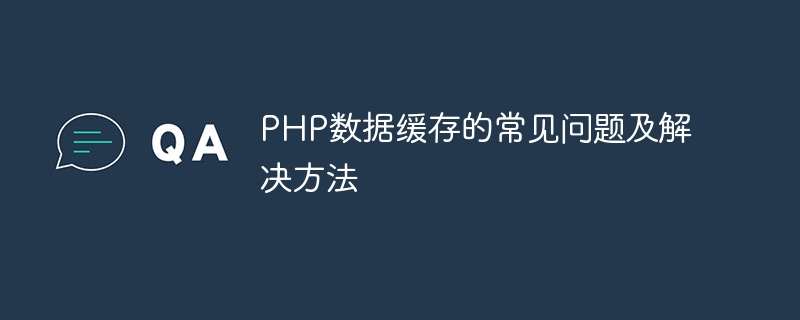

Common problems and solutions to PHP data caching
Caching is one of the important means to improve the performance of web applications. In PHP development, rational use of data caching can significantly reduce access to external resources such as databases and APIs, thereby improving the response speed and scalability of the system. However, data caching also brings some common problems. This article will discuss these problems and provide corresponding solutions.
Cache breakdown means that under high concurrency conditions, a certain cache key becomes invalid, and all concurrent requests directly access the database or other external resources, resulting in Resources are instantly overloaded. The way to solve this problem is to use a mutex lock to ensure that only one thread can update the cache, and other threads need to wait.
$key = 'cache_key';
$value = cache_get($key);
if (!$value) {
acquire_mutex_lock();
// 再次尝试从缓存中获取数据
$value = cache_get($key);
if (!$value) {
$value = fetch_data_from_database_or_api();
cache_set($key, $value);
}
release_mutex_lock();
}Cache penetration refers to accessing data that does not exist in the cache, causing each request to directly access the database or other external resources, causing Database performance degrades. The solution to this problem is to use a Bloom Filter to filter out data that obviously does not exist before querying.
$key = 'cache_key';
$value = cache_get($key);
if (!$value) {
if (bloom_filter_contains($key)) {
$value = fetch_data_from_database_or_api();
cache_set($key, $value);
} else {
$value = null;
}
}Cache avalanche means that within a certain period of time, a large number of cache keys expire at the same time, resulting in a large number of requests to directly access the database or other external resources, causing Resource bottlenecks or even collapse. The way to solve this problem is to set the cache expiration time to fluctuate randomly to avoid a large number of caches from invalidating at the same time.
$key = 'cache_key';
$value = cache_get($key);
if (!$value) {
acquire_mutex_lock();
// 再次尝试从缓存中获取数据
$value = cache_get($key);
if (!$value) {
$value = fetch_data_from_database_or_api();
// 设置缓存失效时间随机波动,避免大量缓存同时失效
cache_set($key, $value, random_expiration_time());
}
release_mutex_lock();
}After the data is updated, the data in the cache is not refreshed in time, resulting in inconsistent data obtained. The way to solve this problem is to actively update the cache when the data is updated.
function update_data($data) {
// 更新数据库中的数据
update_database($data);
// 清除缓存
$key = 'cache_key';
cache_delete($key);
// 主动更新缓存
$value = fetch_data_from_database_or_api();
cache_set($key, $value);
}When multiple processes or threads read and write the same cache Key at the same time, data exceptions or conflicts may occur. The way to solve this problem is to use distributed lock (Distributed Lock) to ensure that only one process or thread can perform write operations at the same time.
$key = 'cache_key';
if (acquire_distributed_lock($key)) {
$value = cache_get($key);
if (!$value) {
$value = fetch_data_from_database_or_api();
cache_set($key, $value);
}
// 释放分布式锁
release_distributed_lock($key);
} else {
// 加锁失败,等待一段时间后重试或进行其他处理
}Summary
Proper use of data cache can significantly improve the performance and scalability of web applications, but it will also bring about some common problems. We can effectively solve these problems by using technical means such as mutex locks, Bloom filters, random expiration times, proactively updated caches, and distributed locks. In actual development, choosing an appropriate solution based on specific circumstances can improve the stability and performance of the system.
The above is the detailed content of Common problems and solutions to PHP data caching. For more information, please follow other related articles on the PHP Chinese website!




